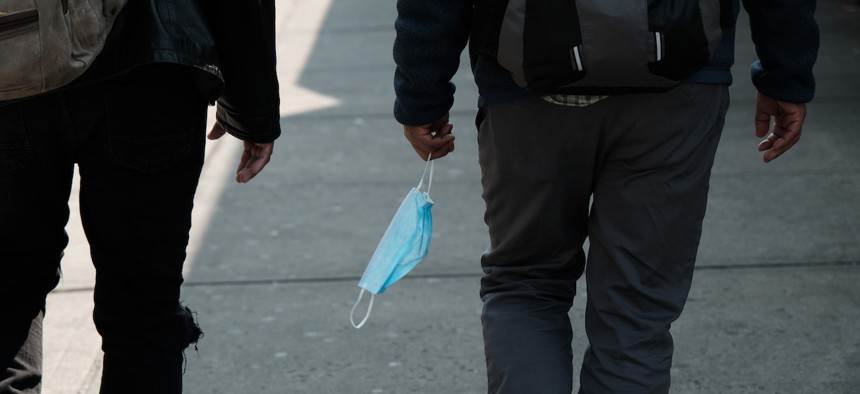
A man carries a mask on May 11, 2023, as he walks along Roosevelt Avenue, which passes through the neighborhoods of Elmhurst, Corona and Jackson Heights in the Queens borough of New York City, areas that witnessed some of the highest numbers of COVID-19 cases and deaths. Spencer Platt/Getty Image
Coronavirus Roundup: The Pandemic Public Health Emergency Is Over
There’s a lot to keep track of. Here’s a list of this week’s news updates and stories you may have missed.
The COVID-19 public health emergency ended on Thursday, marking a significant milestone as it leads to the end of many pandemic era programs and efforts.
But COVID-19 efforts don’t completely end here, the White House outlined earlier this week.
Project Next Gen will accelerate the development of the next generation of COVID vaccines and treatments through public and private partnerships; the government will continue to work to better understand Long COVID; and while the Centers for Disease Control and Prevention will lose some of its data collection authorities, the agency will focus on hospitalizations, deaths and emergency room visits
Also, there will be a new White House office focused on pandemic preparedness, although according to Politico the White House is struggling to find someone to lead it. During the briefing on Thursday, White House Press Secretary Karine Jean-Pierre didn’t have any updates on leadership for the office or the White House COVID-19 response team that is repeatedly getting ready to wind down.
Here are some of the other recent headlines you might have missed.
The Office of Special Counsel said on Thursday that it’s ending its COVID task force launched in March 2020 due to the spike in health and safety related disclosures they were receiving. “The task force achieved outsized results for civil servants facing retaliation during the pandemic by working with agencies to negotiate accommodations for employees,” said OSC in a press release.” Many of these timely ‘course corrections’ were instrumental in helping federal employees, and likely saved lives.”
A bipartisan group of senators introduced a bill on Thursday to create a 9/11 commission style group to examine the pandemic origins and response, after previous efforts during the last session of Congress failed. The task force would be able to hold hearings, issue subpoenas and take testimony. It would have 12 members, six from each party.
The Justice Department inspector general released on Tuesday the results of a survey of federal inmates it conducted from March 28, 2021 to April 27, 2021 of their perceptions of the Federal Bureau of Prison’s management of the pandemic. This was the watchdog’s first-ever survey of federal inmates. Among the findings, “inmates reported that medical and mental health care they received worsened during the lockdowns that the BOP implemented in the first year of the pandemic,” said a summary. “By April 2021, inmates reported that medical and mental health care had begun to improve, but 61% of inmates still rated medical care as ‘poor,’ and 63% rated the mental health care as ‘poor.’”
Nearly $38 million in improper or fraudulent pandemic loans were obtained using the Social Security numbers of deceased people, the Pandemic Response Accountability Committee announced on Thursday.
In the 13-count indictment brought on Wednesday against Rep. George Santos, R-N.Y., who lied about his background and experiences, there were three charges on alleged fraud of pandemic relief programs: the pandemic unemployment assistance program, federal pandemic unemployment compensation program and the Federal Emergency Management Agency’s lost wages assistance program. Santos pleaded not guilty.
Help us understand the situation better. Are you a federal employee, contractor or military member with information, concerns, etc. about how your agency is handling the coronavirus? Email us at newstips@govexec.com.







